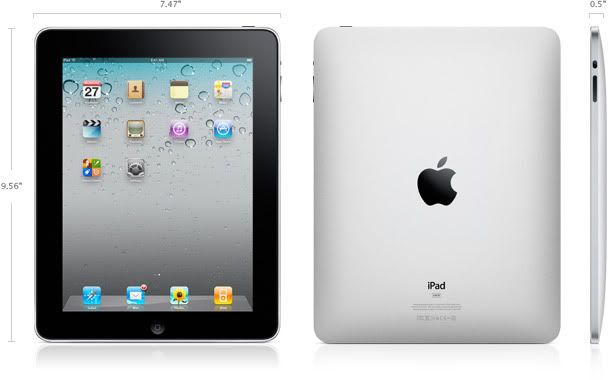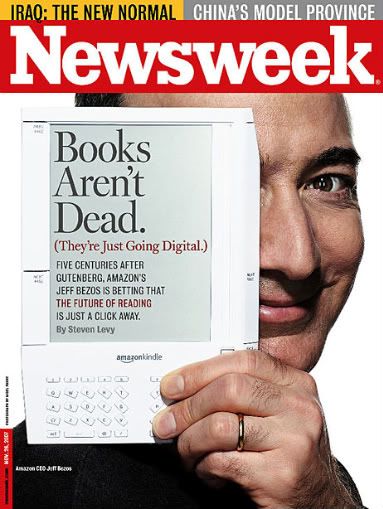Click here to read the first part
Part Two : Tablets
The second approach to e-books was more conventional. Tablets are simply personal computers with often normal LCDs in a, well... tablet form. In the past there have been similar attempts from companies like Intel and Archos to introduce the so-called MIDs (mobile internet devices), but they have failed to effectively penetrate the market. MIDs are larger than smartphones yet smaller than UMPCs (Ultra Mobile PCs), which in turn are smaller than netbooks, so it was never made clear who exactly were the target buyers of these devices.
Here comes Apple and their iPad :
Source : Apple
The iPad still sells like hot cakes, many months after its introduction. Although it
is essentially a larger iPhone 4, and its screen has much lower pixel density (it has roughly the same resolution while measuring 10.1 vs 3.5 diag. inches), it succeeded where the others failed. Why? I guess because it is touted as... supercool. Most of iPad or iPhone buyers do not even look at the speccs, which are quite limited actually. They want them real bad simply because they are a cool and fashionable gadget and they can brag about them to their friends or in their work. But I could analyse the Apple fan-boy psychology in a separate article, let's get back to e-books.
Tablets were naturally not designed or intended exclusively for e-media. It's just that their format makes them suitable for this use as well. But suitable would possibly be an exaggeration. The iPad has a shiny glossy screen that makes it virtually impossible to read under moderately strong ambient light (id est it is sunlight incompatible). e-book exlusive devices have matte screens for exactly that reason.
Furthermore, e-books like Kindle are much closer to the natural feel of paper books.
Most tablets have IPS LCDs but they are still LCDs, with all of the drawbacks I mentioned before. But like I said the iPad sells insanely, and very few of those who buy it would likely intend it primarily for reading e-media. So, much like what has happened with smartphones, the market has already started to be inundated with Android based tablets from competitors who also want a piece of the tablet pie. Let's have a quick look at a couple of them.
This is iPad's main competitor right now, the Galaxy Tab from Samsung :
Source
It runs Android 2.2 and is smaller than the iPad, with a 7" screen. As a result it is also lighter and more portable, fitting in most bags. So it is closer to a pocket book page than a full book, and if the e-media has small fonts you will have to zoom in to read without killing what's left of your eyes; but as we all know that forces us to constantly scroll the page left and right.
Unfortunately it also has a glossy screen.
The other one comes from an old timer in the field :
Source
This very sexy device is the ARCHOS 101 internet tablet As the name suggests it sports a 10.1" screen and is much more sturdily built than both iPad and Galaxy, since it boasts a metal chassis.
Its screen counts 1024 x 600 pixels and unfortunately, you guessed it, it is glossy too.
It costs quite less than iPad or Galaxy, has roughly the same screen speccs and will
not break apart if you drop it from a reasonable height.
Amazon CEO Jeff Bezos
Conclusion.
e-media of all possible forms will eventually replace physical media like books, magazines and newspapers. They may not totally replace them -I still can't see how it could be done with comics for instance- at first but they will stop being the dominant form, as Mr. Negroponte predicted. Costs of printed media will continue to rise and this will be a decisive factor for the transition to e-media. Eventually all major and middle-weight publishers will switch to e-formats. Printed media will likely be produced in minimal volumes to address the wants and needs of some old-fashioned individuals "who love touching, feeling and even smelling paper"*, including myself.
e-books and tablets still cost a lot because it is a niche technology and their R&D has not yet been depreciated. Soon the prices of these devices will drop dramatically and their flaws will be fixed. This will most likely lead to a large scale adoption. And then, I suppose that we should guard our existing books much like we guard our own eyes, because their collectible value and price will rise considerably.
*many thanks to Kiriko and her owner for this line!
© 2010 Nikolaos D. Skordilis
sources:
Daniweb and some of the links cited above




Really enjoyed this two part piece. I do not have an iPad (would love but don't have 'need' for it since I DO have the iPhone) though, I have a Kindle and absolutely love it.
ReplyDeleteI have not in any way given up paperbacks and hardbound books, though. I would say out of the 80 books I've read in 2010, 48 are on my kindle. And, a few of those I've just started in 2011 (never hurts to keep your kindle stocked with extra books). ;-)
I don't think they will take over or actually replace paperback books. But, the are many wonderful uses for them. Schools, Seminars, etc. Though, while having a semester of textbooks on one tablet sized machine -- there is something about being able to flip through an actual textbook and find your notes or recall where you read the fact you are studying/searching for.
I'll definitely be back to keep up on the latest and greatest in the tech world. I love technology!! [This from a farmer's wife] ;-)
Thanks for your comment dear Farmer's wife :)
ReplyDeleteTo -sort of- digitally address that one : "Though, while having a semester of textbooks on one tablet sized machine -- there is something about being able to flip through an actual textbook and find your notes or recall where you read the fact you are studying/searching for." there has already been proposed a digital solution (of some sorts).
It is called Kno and it consists of two 14" screens(!), and according to the manufacturer it is wildly popular among students.
They say that the first batch has already been sold out and they now require you to sign-up to their website to send you an invitation to be eligible for a Kno unit...
Check out here : http://www.kno.com/the-kno and here : http://www.kno.com/waitlist-landing for more.